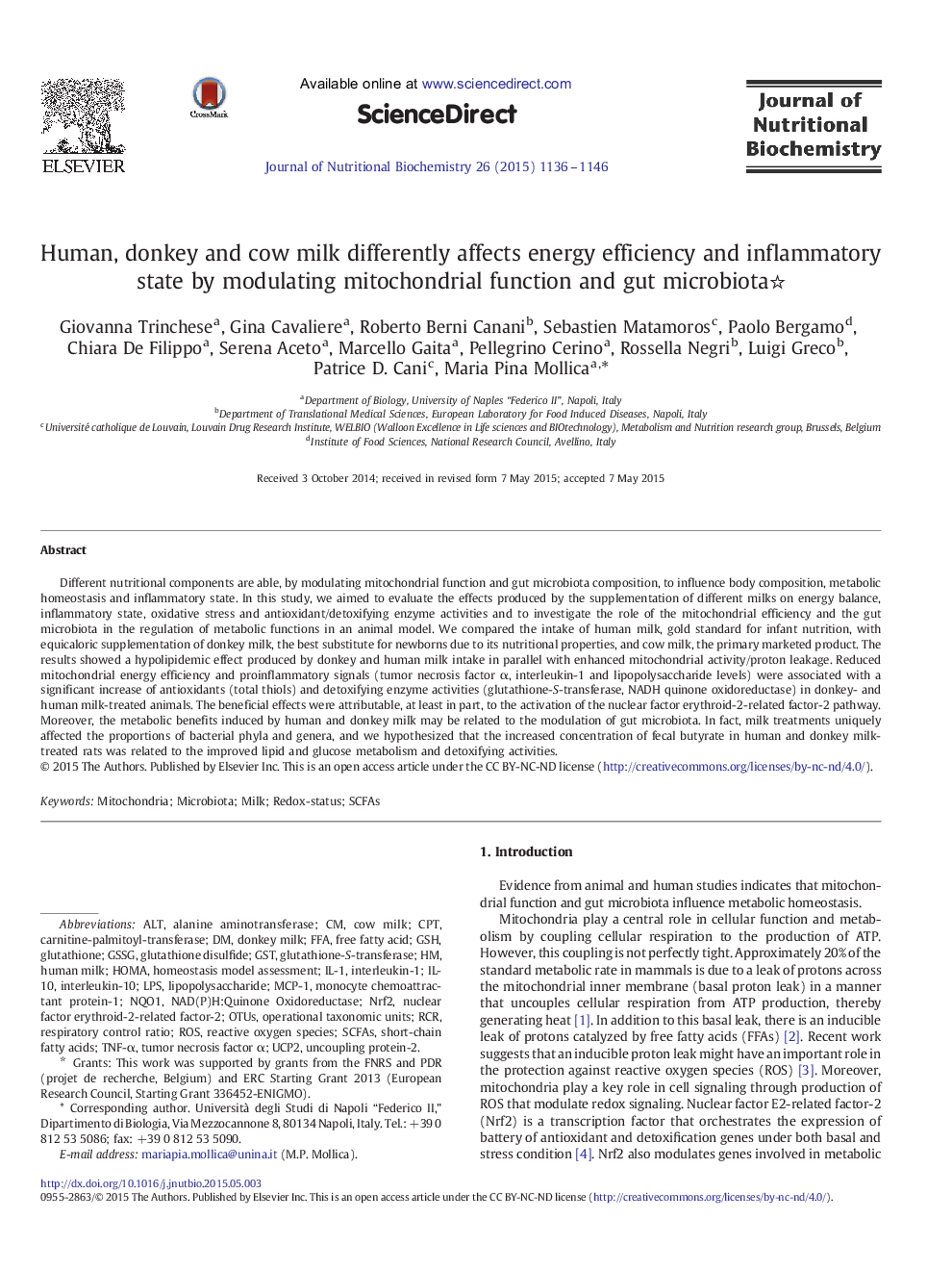| کد مقاله | کد نشریه | سال انتشار | مقاله انگلیسی | نسخه تمام متن |
|---|---|---|---|---|
| 8336772 | 1540643 | 2015 | 11 صفحه PDF | دانلود رایگان |
عنوان انگلیسی مقاله ISI
Human, donkey and cow milk differently affects energy efficiency and inflammatory state by modulating mitochondrial function and gut microbiota
ترجمه فارسی عنوان
شیر انسان، خر و گاو به طور متفاوتی بر راندمان انرژی و وضعیت التهابی تأثیر می گذارد با تعدیل عملکرد میتوکندری و میکروبیوتاسیون روده
دانلود مقاله + سفارش ترجمه
دانلود مقاله ISI انگلیسی
رایگان برای ایرانیان
کلمات کلیدی
Nrf2ALTMCP-1GSSGFFAGSTGSHSCFAsIL-10RCRUCP2CPTIL-1NQO1LPSNAD(P)H:quinone oxidoreductase - NAD (P) H: کینون اکسیدوردوکتازOTUs - OTU هاROS - ROSAlanine aminotransferase - آلانین آمینوترانسفرازHomeostasis model assessment - ارزیابی مدل HomostasisFree fatty acid - اسید چرب آزادShort-chain fatty acids - اسیدهای چرب کوتاه مدتInterleukin-10 - اینترلوکین 10interleukin-1 - اینترلوکین-1tumor necrosis factor α - تومور نکروز عامل αMilk - شیرDonkey milk - شیر خرHuman milk - شیر مادرCow milk - شیر گاوTNF-α - فاکتور نکروز توموری آلفاlipopolysaccharide - لیپوپلی ساکاریدMitochondria - میتوکندریاMicrobiota - میکروبیوتاrespiratory control ratio - نسبت کنترل تنفسیHOMA - هومOperational taxonomic units - واحدهای تاکسونومی عملیاتیmonocyte chemoattractant protein-1 - پروتئین شیمیایی monocyte chemoattractant-1Glutathione - گلوتاتیونglutathione-S-transferase - گلوتاتیون S-ترانسفرازglutathione disulfide - گلوتاتیون دی سولفیدReactive oxygen species - گونههای فعال اکسیژن
موضوعات مرتبط
علوم زیستی و بیوفناوری
بیوشیمی، ژنتیک و زیست شناسی مولکولی
زیست شیمی
چکیده انگلیسی
Different nutritional components are able, by modulating mitochondrial function and gut microbiota composition, to influence body composition, metabolic homeostasis and inflammatory state. In this study, we aimed to evaluate the effects produced by the supplementation of different milks on energy balance, inflammatory state, oxidative stress and antioxidant/detoxifying enzyme activities and to investigate the role of the mitochondrial efficiency and the gut microbiota in the regulation of metabolic functions in an animal model. We compared the intake of human milk, gold standard for infant nutrition, with equicaloric supplementation of donkey milk, the best substitute for newborns due to its nutritional properties, and cow milk, the primary marketed product. The results showed a hypolipidemic effect produced by donkey and human milk intake in parallel with enhanced mitochondrial activity/proton leakage. Reduced mitochondrial energy efficiency and proinflammatory signals (tumor necrosis factor α, interleukin-1 and lipopolysaccharide levels) were associated with a significant increase of antioxidants (total thiols) and detoxifying enzyme activities (glutathione-S-transferase, NADH quinone oxidoreductase) in donkey- and human milk-treated animals. The beneficial effects were attributable, at least in part, to the activation of the nuclear factor erythroid-2-related factor-2 pathway. Moreover, the metabolic benefits induced by human and donkey milk may be related to the modulation of gut microbiota. In fact, milk treatments uniquely affected the proportions of bacterial phyla and genera, and we hypothesized that the increased concentration of fecal butyrate in human and donkey milk-treated rats was related to the improved lipid and glucose metabolism and detoxifying activities.
ناشر
Database: Elsevier - ScienceDirect (ساینس دایرکت)
Journal: The Journal of Nutritional Biochemistry - Volume 26, Issue 11, November 2015, Pages 1136-1146
Journal: The Journal of Nutritional Biochemistry - Volume 26, Issue 11, November 2015, Pages 1136-1146
نویسندگان
Giovanna Trinchese, Gina Cavaliere, Roberto Berni Canani, Sebastien Matamoros, Paolo Bergamo, Chiara De Filippo, Serena Aceto, Marcello Gaita, Pellegrino Cerino, Rossella Negri, Luigi Greco, Patrice D. Cani, Maria Pina Mollica,
